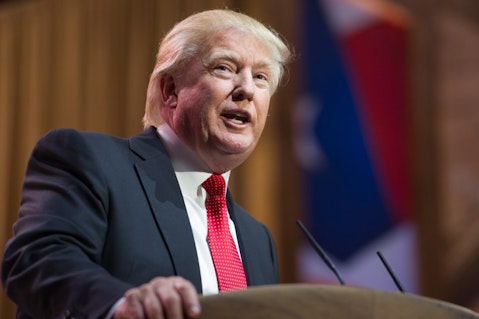The 10 biggest companies that do not support Trump did more than just refrain from associating with the new U.S president.
The average company is understandably wary about choosing sides in political matters. As basketball great Michael Jordan allegedly said when asked about his silence on social issues during his heyday, “Republicans buy sneakers too.” Therefore, it is logical for companies to remain politically inoffensive if they want to get as many customers as they can. And while some companies donate to candidates or lobbyists, they do so more likely due to business interests than ideological convictions. Hence, companies are better served if they stay silent publicly concerning politics and let their money and lobbyists do the talking. Even now, the typical company can be considered to be neither for or against Trump.
However, these are not typical times. The election of President Trump (and it still feels weird to type out that phrase) has ushered in a wave of new policies that are doubtless polarizing, to say the least. Heck, even his election has been polarizing; his supporters back him rabidly, while his critics are passionate in their opposition. The most polarizing of these regulations (or attempted regulations) is an immigration ban on people from Iran, Iraq, Libya, Somalia, Sudan, Syria, and Yemen. The executive order, which Trump signed in late-January, was immediately blocked in the courts in early-February. A newer version of the ban, this time removing Iraq from the list of countries affected, was signed in March and then blocked again in the same month.

Christopher Halloran / Shutterstock.com
Over the course of the contentious immigration ban, 97 mostly tech-oriented companies participated in filing court briefs against the order. Opponents of the order included some of the most valuable companies in the world and involved companies in various states of approval or disapproval towards the current administration. Even vaunted startup unicorns were in on the action, like Airbnb (valued at $31 billion), which even offered free housing to refugees affected by the ban, and Uber (valued at $70 billion), whose CEO was even part of Trump’s advisory council just days before the signing of the order (he had just exited the council days before the order was signed).
Nevertheless, the companies that opposed the order are doing so at the risk of earning the ire of Trump, who is known to attack companies on social media, and the President’s supporters, some of which are even considering a boycott against companies that oppose the ban (though good luck with that, because to effectively pull off that boycott, people would have to eschew basically every modern technology in existence).
Hence, by “companies that do not support Trump,” we actually mean companies that do the opposite of supporting Trump, because there are a lot more companies that are not siding with Trump just because they are neutral, at least for now. The 10 biggest companies that do not support Trump are listed in accordance to their market capitalizations as of April 7.
If you’re looking for the other side of the coin, don’t miss the list of the 10 Biggest Companies That Support Trump.





